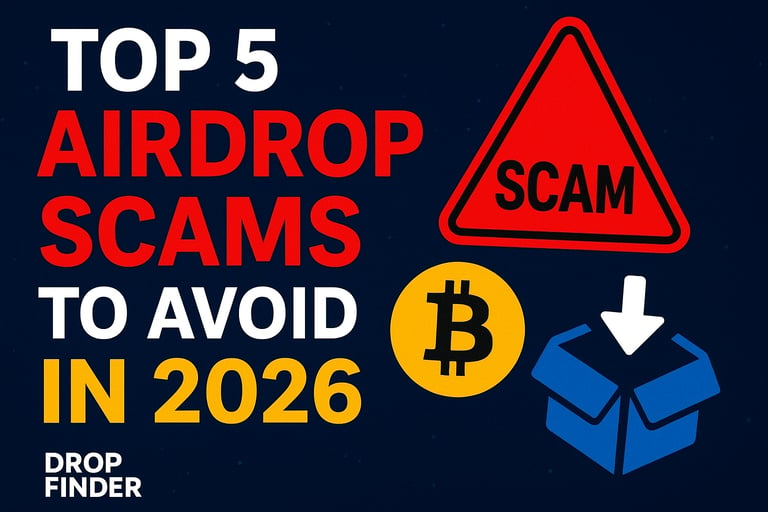Top 5 Airdrop Scams to Avoid in 2026 – Stay Safe with Drop Finder
Discover the top 5 airdrop scams to avoid in 2026, including phishing, fake tokens, and pay-to-claim traps. Learn how Drop Finder helps you stay safe while finding real and rewarding crypto airdrops.
LATEST AIRDROPICOCRYPTO NEWS
10/3/20255 min read
Top 5 Airdrop Scams to Avoid in 2026 – Stay Safe with Drop Finder
Cryptocurrency has transformed the financial world into an arena of innovation, opportunity, and unfortunately, deception. One of the hottest trends in the crypto space is airdrops—free token giveaways meant to spread awareness, reward communities, and promote blockchain projects.
Legitimate airdrops can be life-changing for early adopters. In fact, some past examples like Uniswap (UNI), Aptos (APT), and Arbitrum (ARB) have handed out tokens worth thousands of dollars to users who qualified. Platforms like Drop Finder help crypto enthusiasts track upcoming and ongoing airdrops in one convenient dashboard, making it easier to catch genuine opportunities.
But while the opportunities are real, so are the dangers. With every legitimate airdrop, dozens of fake, scammy, or malicious airdrops are created by bad actors. These scams are designed to steal your personal information, drain your wallet, or lure you into fraudulent schemes.
In this article, we’ll dive into the Top 5 Airdrop Scams to Avoid in 2026, explain how they work, share real-world examples, and give you practical tips to protect yourself. Whether you’re a beginner or a seasoned crypto hunter, understanding these scams is critical to your safety.
1. Phishing Airdrop Scams
How They Work
Phishing is one of the oldest tricks in the scammer’s book. In crypto airdrops, phishing scams usually come in the form of fake websites, emails, or social media posts that look nearly identical to legitimate projects. The fraudsters will mimic the branding of a popular blockchain, token, or platform and trick users into connecting their wallets.
The moment you connect your wallet and “claim” the fake airdrop, you unknowingly give hackers permission to drain your funds or steal your private keys.
Example
In 2024, a fake version of Arbitrum’s airdrop page went viral on Twitter and Telegram. Thousands of unsuspecting users connected their MetaMask wallets, only to wake up and find their ETH stolen.
How to Avoid
Always check the official website or verified social media accounts for announcements.
Never click on random Telegram or Discord links shared by strangers.
Use Drop Finder, which lists only verified airdrops and cross-checks sources before listing them.
Drop Finder Advantage
When airdrops like Swell, LayerZero, or zkSync are trending, scam sites pop up instantly. Drop Finder filters them out by aggregating only authentic announcements directly from project teams.
2. Private Key Airdrop Scams
How They Work
This scam is shockingly simple yet still effective. Fake airdrops will ask you to submit your private key to “verify eligibility” or “import a special wallet.” Once you hand over your private key, your wallet is permanently compromised.
The truth is: No legitimate airdrop will EVER ask for your private keys.
Example
Back in 2022, fake Solana airdrop groups on Telegram convinced users to paste their seed phrases into a “claim form.” Within hours, scammers emptied their wallets.
How to Avoid
Never share your private key or seed phrase with anyone.
Use hardware wallets for storing your main funds.
Remember: airdrops require wallet connection, not private key sharing.
Drop Finder Advantage
Every airdrop listed on Drop Finder is vetted. No listings ever require private keys—only safe, smart-contract-based claim methods.
3. Fake Token Airdrops (Dusting Scams)
How They Work
Have you ever opened your wallet and seen random, unknown tokens? This is called dusting. Scammers send tiny amounts of fake tokens to your wallet. When you try to interact with these tokens—like swapping or transferring them—you unknowingly trigger a malicious smart contract that grants hackers access to your wallet.
Some fake airdrops even ask you to “swap” their worthless tokens on shady DEXs, tricking you into paying high gas fees or interacting with harmful contracts.
Example
In 2025, many Ethereum wallets started receiving fake “USDT Rewards” tokens. Users who tried to swap them on a fake exchange lost access to their funds.
How to Avoid
Never interact with unknown tokens that randomly appear in your wallet.
Research tokens on sites like CoinGecko or Etherscan before making a move.
Stick to legitimate airdrops listed on Drop Finder—not random “gifts.”
Drop Finder Advantage
Drop Finder shows genuine tokens with verified contracts. If you don’t see the airdrop listed there, it’s safer to ignore it.
4. KYC Exploitation Airdrops
How They Work
Some airdrops require Know Your Customer (KYC) verification. While many regulated projects legitimately use KYC, scammers exploit this by asking users to upload IDs, passports, or selfies in exchange for “free tokens.”
Once submitted, your identity documents are stolen and may be used for fraudulent activities, including creating fake accounts or laundering money.
Example
A fake “exchange” in 2023 lured thousands of people with a “KYC airdrop” offering 200 USDT. Victims uploaded government IDs, only to later discover their data was being sold on darknet forums.
How to Avoid
Only submit KYC on regulated, well-known platforms.
If an airdrop asks for sensitive data and you’re unsure, skip it.
Legit projects like Binance or Coinbase may need KYC—but random Telegram groups never should.
Drop Finder Advantage
Drop Finder flags airdrops requiring unnecessary KYC. If it isn’t a trusted project, you won’t see it listed.
5. Pay-to-Claim Airdrops
How They Work
This is perhaps the sneakiest scam. Fraudsters ask users to pay a small “transaction fee” or “unlock fee” to claim free tokens. Once you send funds, the tokens never arrive.
Sometimes these scams appear polished, with slick websites and countdown timers to create FOMO (fear of missing out). But remember: airdrops are free. If you’re paying, it’s not an airdrop—it’s a scam.
Example
A fake “Polygon airdrop” in 2025 charged users $20 in ETH to unlock 500 free MATIC. No tokens were ever distributed.
How to Avoid
Legitimate airdrops don’t charge upfront fees.
Verify the official announcement from the project.
When in doubt, cross-check the event on Drop Finder.
Drop Finder Advantage
Drop Finder only lists free and authentic airdrops. No paywalls, no hidden fees.
Why Airdrop Scams Are Rising in 2026
The crypto industry is booming. With Bitcoin adoption surging, Ethereum scaling solutions thriving, and Layer 2 ecosystems like Arbitrum, Optimism, and Swell gaining momentum, more users are flooding the space.
Scammers thrive in high-growth environments because:
FOMO is strong: People don’t want to miss the “next big airdrop.”
Education is weak: New users don’t understand the risks.
Verification is hard: Projects spread across multiple blockchains and platforms.
That’s why a centralized hub like Drop Finder has become essential in 2026. It saves users from the constant noise and ensures only real, valuable, and safe airdrops reach their dashboard.
How Drop Finder Helps Protect You
Drop Finder isn’t just an airdrop aggregator—it’s your first line of defense against scams. Here’s how it helps:
Verification – Each airdrop is vetted with project links, whitepapers, and official announcements.
Security Filters – No listings that ask for private keys, upfront payments, or shady KYC.
Transparency – Every airdrop includes direct project links so you can double-check yourself.
User-Friendly UI – Easy to track, compare, and join airdrops without jumping through suspicious hoops.
With features like crypto charts, project descriptions, and admin-verified listings, Drop Finder is quickly becoming the trusted hub for airdrop hunters worldwide.
Final Thoughts
The world of crypto airdrops is full of opportunity and risk. While genuine airdrops can deliver thousands of dollars in free tokens, scammy ones can wipe out your wallet or compromise your identity.
In 2026, the top 5 airdrop scams to avoid remain:
Phishing Airdrops
Private Key Airdrops
Fake Token Dusting Scams
KYC Exploitation Airdrops
Pay-to-Claim Airdrops
Your best defense is awareness, caution, and using reliable platforms like Drop Finder to guide your journey.
Airdrops are not just free money—they are opportunities. But only if you know how to separate the real from the fake. Stay alert, use trusted sources, and never forget the golden rule: If it sounds too good to be true, it probably is.




